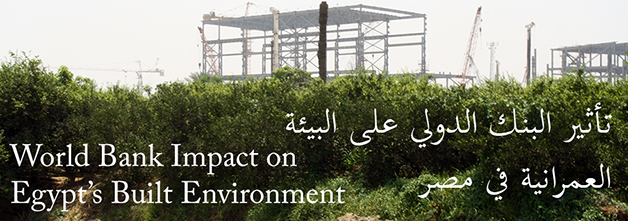Giza North | شمال الجيزة
The Giza North power project is a 2,250 MW combined cycle natural gas-powered plant for the production of electricity, located at the northern edge of the Giza governorate in Egypt. This $2.18 billion project is being financed by the World Bank, the European Investment Bank (EIB), and the OPEC Fund for International Development, with the World Bank contributing $840 million via the International Bank for Reconstruction and Development (IBRD). The project is located in fertile agricultural land in the driest region in the world, raising questions about whether alternative sites were properly evaluated and considered. Farmers residing and working the land surrounding the project site have also experienced negative impacts on their land, water, and livelihoods due to the project’s current construction phase, and are worried about what the permanent environmental and social effects of the project will be.
Several civil society organizations are coordinating to organize the farmers and local communities to express their concerns to the implementing company, the government, and the international funders including the World Bank.
This case study (Arabic) on the impacts of the Giza North power plant on surrounding lands and communities was written by Abdelmawla Ismail.
هذه دراسة حالة بقلم عبد المولى إسماعيل تلقي الضوء على موضوع تأثيرات محطة شمال الجيزة لإنتاج الكهرباء على الأراضي والمجتمعات المحيطة
Egypt World Bank Portfolio | حافظة إستثمارات البنك الدولي في مصر
This is a snapshot of active projects that the World Bank is funding in Egypt, updated in December 2011. Each project is described in terms of the type of project, the amount the World Bank and other lenders are financing, and the location of the project. More information about the Bank’s projects can be found on the World Bank’s website, and can be accessed through its Access to Information Policy.
World Bank Projects in Egyptحافظة-استثمارات-البنك-الدولي-الحالية-فى-مصر
World Bank Impact on Built Environment in Egypt Study
This study provides an overview of the role the World Bank has played in Egypt’s development of its built environment from 2006 to 2012.
The study was written by right-to-housing activist and blogger Yahia Shawkat.
توفر هذه الدراسة نظرة على دور لعب البنك الدولي في تطوير البيئة العمرانية في مصر من عام 2006 الى 2012.
باحث ومؤلف الدراسة يحيى شوكت وهو ناشط وكاتب مدونة على قضية الحق في السكن.
About Us | من نحن؟
The Bank Information Center (BIC) is an organization based in Washington, DC that partners with civil society in developing and transition countries to influence the World Bank and other international financial institutions (IFIs) to promote social and economic justice and ecological sustainability. BIC is an independent, non-profit, non-governmental organization that advocates for the protection of rights, participation, transparency, and public accountability in the governance and operations of the World Bank Group and regional development banks. We are not affiliated with the World Bank.
BIC’s Middle East and North Africa (MENA) program engages with local groups based in our four focus countries – Egypt, Lebanon, Tunisia, and Yemen – to raise civil society awareness of the role, activities, and impacts of the World Bank Group in the region, and to support informed public engagement in development decision-making.
مركز معلومات البنك هو هيئة مستقلة، غير هادفة للربح وغير حكومية، تعمل من أجل حماية الحقوق ودعم قيم المشاركة والشفافية و المساءلة العامة في إدارة وعمل المؤسسات المالية الدولية مثل البنك الدولي وبنوك التنمية الإقليمية وصندوق النقد الدولي. يتعاون المركز مع مؤسسات المجتمع المدني في البلدان النامية والإنتقالية للتأثيرعلى سياسات وأساليب إتخاذ القرار في البنك الدولي والمؤسسات المالية الدولية الأخرى من أجل دعم العدالة الإجتماعية والإقتصادية والبيئة.
يتعاون برنامج الشرق الأوسط وشمال أفريقيا للمركز مع جمعيات المجتمع المدني في اليمن، مصر, لبنان, وتونس لكي يرفع الوعي عن دور البنك الدولي في المنطقة وتأثيره ونشاطاته، ولكي يعزز المشاركة العامة في اجرائات التنمية.
About the Project | عن هذا المشروع
This project aims to introduce the role of the World Bank in Egypt’s built environment – e.g. the Bank’s work and influence in the housing and urban planning sector in Egypt – to civil society groups already working on issues related to that sector.
The project’s goals are:
- To raise awareness about the role of the World Bank as one actor in the development decisions and actions being taken in this sector
- To build capacity among civil society organizations working on built environment in Egypt as to methods for effective engagement with the World Bank and other development actors, such that there is an informed and capable core group of organizations that regularly engages with the World Bank
- To facilitate the transfer of this model to other sectors where the World Bank is engaged in Egypt


